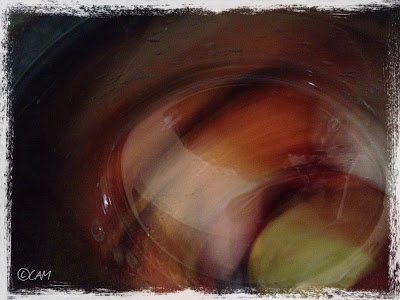The plan was to do nothing. To spend a week enjoying my garden, relaxing in a quiet house and taking advantage of the solitude.
As usual, I didn’t follow the plan.
For one whole week I was going to have the place to myself and I was going to enjoy my tidy little house
and not lift a finger if I didn’t want to.
The problem is, I just can’t sit still that long and almost immediately I was surrounded by a chaos and clutter.
For some reason, I can’t
remember what I was looking for, I went to the basement storeroom and
dug around in a couple of boxes. In the process I unearthed, among other
things, a package of slides that had been missing for several years and
I completely lost track of time while I held paper-framed squares of
film up to the light. Of course I brought the box upstairs with me and
soon they were scattered across the top of the dining room table. I didn’t want to put them away again until I got them marked and sorted so they're still there.
The next day I realized that this would be a good time to wash summer’s
dust and dirt out of the slipcovers that cover the sofa and chairs in
the living room. Now the room is tumbled with cushions and furniture
wearing only its white muslin “underwear.”
The rug store called to say the old rug I’d bought online and had cleaned was ready, so I picked it up and dropped the long, heavy, rolled carpet in a corner. I’ll put it down after I wrestle the furniture back into the slipcovers.
I ran a few errands one day and couldn’t resist stopping by one of my favorite antiques stores. Wouldn’t you know, just as I was leaving with empty hands, one of the dealers walked in with the little bedside table I’d been searching for. I brought it home and put it in place, but now the old table has no place so it’s pushed into a corner until I can take it down to the store room. And I’m afraid of what will happen if I go back down there.
I
woke up one cool morning and pulled out
a sweater. I decided, while I was at it, to put away all the
linen and lightweight pieces and bring out the rest of my sweaters and winter clothing. It
was easier to sort everything while it was all out and soon there was a
big pile of giveaway items in the dining room, beside the table still
littered with photographs.
I
watched a movie one night and instead of making a nest on the sofa I organized the linen closet while it
played. More sorting and a stack of old towels and sheets added to the
giveaway pile.
I
have no one but myself to blame for this mess, but the tidy little
house I was going to enjoy is now a wreck. And the book I was dying to
read? Still unopened on the (new) little table by the bed.
Why is it some of us just can’t sit still? Can’t leave well enough alone? I think of myself as semi-retired. I’ve
stopped working full time and have even cut back on my part-time
writing assignments. I wanted more free time to take care of myself and
the flexibility to enjoy time with my family. But for the life of me, I
just can’t get the knack of it. If there isn’t a project, I invent one.
My solo staycation ends tomorrow. I have a dinner party coming up. And my house is a disaster.
I have a lot of work to do, but this time I mean it. I’m going to get everything straightened up, put away and organized and I’m going to leave it that way.
Right after I paint the bathroom. I hadn’t noticed how drab it looks.
This essay first appeared in Spokane's "Prime" magazine and in The Spokesman-Review's "Pinch" edition. Cheryl-Anne Millsap’s audio essays can be heard each week on Spokane Public Radio. She is the author of “Home Planet: A Life in Four Seasons” and can be reached at catmillsap@gmail.com

























